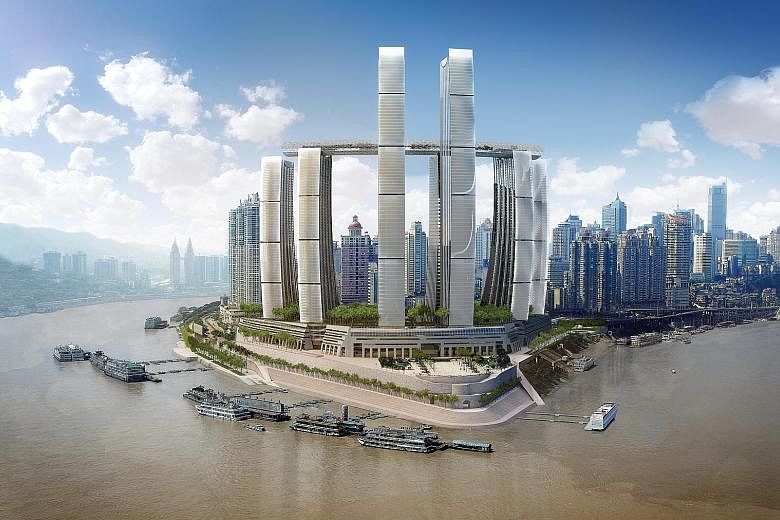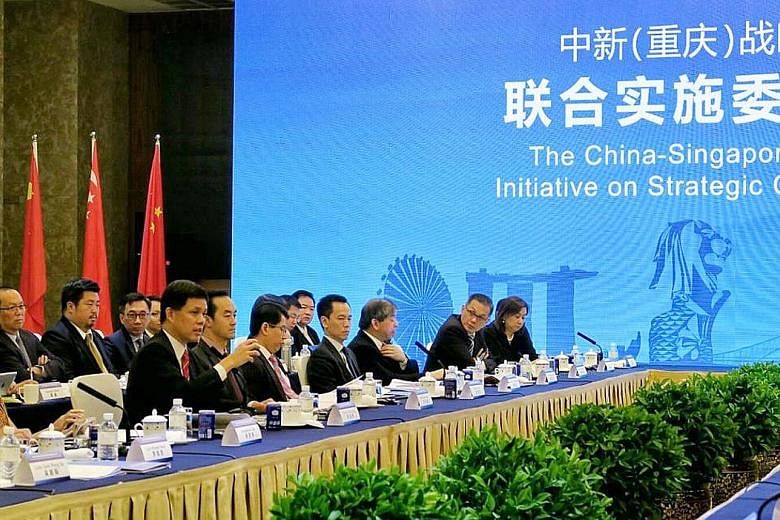Singapore is working with Chongqing to open up new routes for the transportation of goods from the south-western Chinese city to China's coast and beyond, as part of a major Singapore-China project launched last year.
Both sides will also work together to develop the city's logistics sector, by linking air, rail, road and river transport networks.
And they will work to create a paperless, electronic platform that port operators, shipping agents and banks, among others, can use to exchange information efficiently.
Minister in the Prime Minister's Office Chan Chun Sing yesterday outlined these three broad areas that Singapore and Chongqing are collaborating on, under a transport and logistics masterplan aimed at transforming the city into the logistics hub of China's vast western region.
Singapore-based consultancy Surbana Jurong has been appointed to lead the masterplan, which comes under the Chongqing Connectivity Initiative (CCI), Singapore's third government-to-government project with China.
Speaking to Singapore journalists after a meeting on the CCI with his Chinese counterparts, Mr Chan said these developments will help reinforce China's "One Belt, One Road" strategy, announced by Chinese President Xi Jinping in 2013.
The ambitious infrastructure and economic development strategy aims to connect 65 countries over three continents via an overland belt that links China with Europe, and a sea route that passes through South-east Asia, Africa and the Middle East.
"If we are able to do these three pieces well, Chongqing will be able to bring down (business) costs, and may be able to overcome the potential bottleneck of the Three Gorges Dam," said Mr Chan, referring to how goods are now typically transported via the Yangtze River that the dam spans.
He added that the Three Gorges Dam, built partly to increase China's shipping capacity, is soon reaching its maximum limit. It already handles about 120 million tonnes of shipping per year.
Mr Chan said both he and Chongqing Mayor Huang Qifan agreed that opening a new route from Chongqing to the south would be the best way to ease the bottleneck.
On the plan to develop a multi- modal logistics sector that connects air, rail, road, and river travel, Mr Chan said that for a start, a seminar will be organised in the next two months for companies in the sector to discuss ideas.
He added that Prime Minister Lee Hsien Loong, who will travel to China today, may discuss the transport and logistics masterplan with Mr Xi at a bilateral meeting.
He also took stock of the CCI's three other priority areas: financial services, aviation, and information and communications technology.
In the financial services sector, more than US$6 billion (S$8.2 billion) worth of deals have been inked as of July, said Mr Chan.
Direct flights between Singapore and Chongqing have also gone up from five to 14 per week, and will increase to 17 per week this month.
Both sides are also working on developing a "digital super highway" that will provide high-speed connectivity between Singapore and Chongqing to support the new digital and sharing economy, he said.
Yesterday, CapitaLand group chief executive Lim Ming Yan said his company's Raffles City Chongqing project, situated at Chaotianmen, is on track and will be completed in phases from 2018.
He said the development, which comprises seven towers, will be a "natural platform" for Singapore firms hoping to make inroads into the western part of China, and for Chinese companies hoping to expand into South-east Asia.
Pearl Lee



